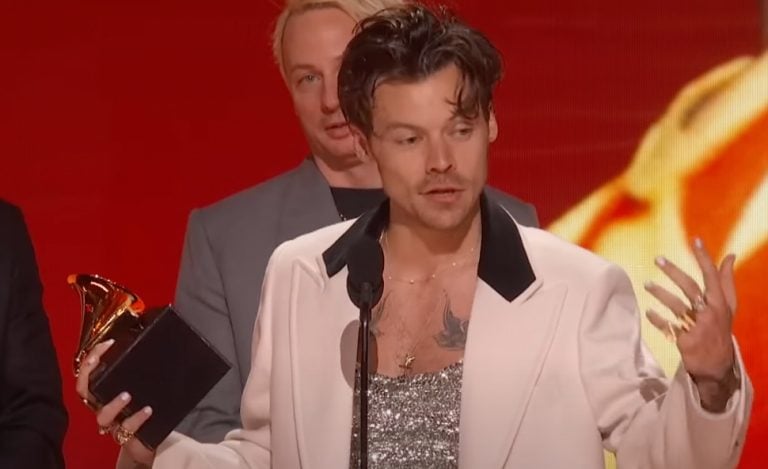“This doesn’t happen to people like me very often.” This is what the winner for Album of the Year at this weekend’s Grammys said in their acceptance speech. If you didn’t know the name of the winner and perused the list of nominees, who would you think had said that huge statement? Lizzo? Beyoncé? Bad Bunny? Harry Styles?!
It was the English popstar that unexpectedly triumphed on Sunday night and his acceptance speech, while pretty tame and innocuous on the surface, sparked enraged reactions online.
Many on social media pointed out that white, cisgender artists like the former One Direction star frequently do win such prized awards. Of the last 10 winners for Album of the Year at the Grammys, only two were people of colour; Beyoncé, thwarted by Styles on Sunday, infamously lost out to indie rock icon Beck in 2015 when many thought her self-titled album deserved to win that year.
As many noted, there were other historic – “this (GENUINELY) doesn’t happen to people like me very often” – choices up for Album of the Year in 2023: Beyoncé would have become the first black women since 1999 to win it, while Bad Bunny would have become the first ever Puerto Rican to triumph.
A lot of commentators cited Styles’ speech as an example of white privilege. And then the Brits, as they so often do, arrived out of nowhere.
“Attention Americans complaining about white male Harry Styles saying ‘this doesn’t happen to people like me often’. Wind your necks in – social inequalities are not same everywhere as in America. In the UK class is a massive barrier to success in creative fields,” wrote one Twitter user.
A lot of people from across the pond agreed with his view, suddenly hailing Styles as a figure of British working class excellence winning over American audiences.
Love Music?
Get your daily dose of metal, rock, indie, pop, and everything else in between.
But the transatlantic divide is always murky, particularly when class is involved. Others were just as eager to point out that Styles was in fact not that working class at all, with his parents being a landlord and a banker. People even started to look into his background, claiming that the “middle class” town he grew up in, the tiny Holmes Chapel, was in the top 20 least deprived areas in the entire U.K..
In a way – “murky” really is the word – both things can be true: Harry Styles can be non-working class, even come from a background of recognised privilege, and he can also have not had intimate access to the channels into British media that the truly wealthy have (he got his first big break on a TV singing competition).
Who’d be a globally famous musician, huh? Beyoncé probably should have finally won Album of the Year for her marvellous Renaissance (this writer thought Kendrick Lamar‘s conflicted, chaotic, but masterful Mr. Morale & the Big Steppers deserved to win), but Styles can enjoy his moment for now, providing he doesn’t frequent Twitter much.
Just remember the audience next time – not every country is as obsessed with class mobility as the Brits, Harry.
For more on this topic, follow the Pop Observer.
https://twitter.com/neilfaz/status/1622663499561279510?s=21
https://twitter.com/fenianhag/status/1622609524392620036?s=21
Have discovered why everyone's pissed off with Harry Styles (against my will) and I think it speaks to the transatlantic cultural divide that I immediately understood that he was talking about being a working class kid in the arts and yet it was still a dumb thing to say
— John "Atlantic Charter Defence Squad" C (@BadSocialism) February 6, 2023
https://twitter.com/formulaamelia/status/1622737046400913409?s=21
Harry Styles supposedly grew up poor but lived in a the town which is in the top 20 least deprived areas in the uk (out of 8,414). His mother was a landlady and his dad a finance worker but because he had a weekend job at a bakery he somehow had a working class background.
— t (@swrtsg) February 6, 2023
everytime someone calls harry styles working class a part of me dies
— teejie (@iasipenjoyer) February 6, 2023
https://twitter.com/josephstash/status/1622564050314960897?s=21
Not saying the Brits reward privilege, but the AotY nominees are Wet Leg (posh girls from the Isle of Wight), The 1975 (middle class, nepo-baby fronted), Fred Again (the *incredibly* posh son of two actual peers), Harry Styles (son of a landlord and a banker) … and Stormzy
— Marc Burrows (@20thcenturymarc) February 6, 2023
https://twitter.com/qitweets/status/1622629866192482305?s=21
Far be it for me to defend a white dude but I think ppl forget Harry came from a single parent working class family in a country with zero social mobility whose entertainment industry is dominated by the middle classes. I get it! (probably not the time to say it tho) https://t.co/80EsFkpZO9
— Otegha K. Uwagba (@OteghaUwagba) February 6, 2023


































